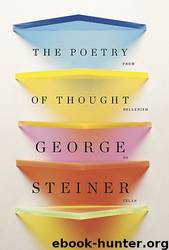The Poetry of Thought by George Steiner

Author:George Steiner [Steiner, George]
Language: eng
Format: epub
Published: 0101-01-01T00:00:00+00:00
Whoever is ultramodern and ascetic
Will find Husserl most sympathetic.
Though there is rumor going through the land He was someone Heidegger could never understand.
Austria generates and experiences the tragedy of psychoanalysis. Freud coveted the Nobel Prize for medicine. He received the Goethe Prize for literature. No physiologist or clinical psychologist spoke at his eightieth birthday: it was Thomas Mann. Sigmund Freud is among the masters of German prose. His style has a clarity, a sinuous suppleness, a control of pace comparable to that of the German classics. Its wellspring is the tension, at times raw, between Freud’s positivistic, scientific intent and the inventive genius of the writer. In the later texts that genius tends to prevail.
What now remains of psychoanalytic theory, of its physiological inference? What demonstrable cures has it brought? The typological Freudian neurotic has faded into Central European history, into the vanished era of a bourgeoisie, largely feminine, largely Jewish, from whose contingent historical context her or his troubles arose. The patriarchal, masculine codes of sexuality on which Freudian models and teachings are founded have all but receded into the archaeology of European values. Freudian reductionism, his neglect of the historicity, of the sociology of dreams, his magisterial innocence in regard to the generative structures of language have succumbed to a more complex, biochemically, neurologically, socially informed mapping of consciousness and its pathologies. We now recognize that unexamined trust at the heart of the psychoanalytic method: no less than Aristotle, Descartes or Hegel, Freud took it for granted that syntax relates organically to the realities it segments and articulates, that words speak the world. Only because of their intentional stability, their “truth-functions,” can words be psycho-analytically excavated, can their vertical concealments and suppressions be unmasked. The deconstructive proposal that language is in arbitrary motion, that meaning itself is a nonverifiable convention, that there are no insured bonds between discourse and that which is naively, ideologically postulated to exist “out there”—an axiom even of uttermost classical skepticism—the claim that "anything goes” would have struck Sigmund Freud as infantile clowning or madness.
Yet is is precisely such proposals which inspire deconstruction and post-structualism. Freud’s “language-classicism” is the more astonishing as the incipient tremors of the great crisis are at hand around him. They are inherent in Mallarme’s finding that words entail the absence of that which they designate, that language is on-tologically void; they inspire the nonsense poetics of Dada, direct begetter of our current rhetoric of nihilism; we sense them in the Vienna Circle’s attempt to formalize meaning meta-mathematically, in Karl Kraus’s corrosive reflections on the “death of language,” in Wittgenstein’s exclusion from it of ethical and aesthetic substance. For Freud nothing cataclysmic has happened to the Logos since the Nichomachean Ethics. How else could pre-Lacanian psychoanalysis operate?
In compensation we have the resources of the writer, of the builder of myths comparable to Plato, of the teller of tales. The accounts of the “Dora” case, of the Wolf Man belong among the masterpieces of the nineteenth-century novel (the Wolf Man himself later raged at what he took to be an exploitative fiction).
Download
This site does not store any files on its server. We only index and link to content provided by other sites. Please contact the content providers to delete copyright contents if any and email us, we'll remove relevant links or contents immediately.
| Booksellers & Bookselling | General |
| History of Books |
4 3 2 1: A Novel by Paul Auster(12344)
The handmaid's tale by Margaret Atwood(7714)
Giovanni's Room by James Baldwin(7280)
Asking the Right Questions: A Guide to Critical Thinking by M. Neil Browne & Stuart M. Keeley(5723)
Big Magic: Creative Living Beyond Fear by Elizabeth Gilbert(5698)
Ego Is the Enemy by Ryan Holiday(5370)
The Body: A Guide for Occupants by Bill Bryson(5050)
On Writing A Memoir of the Craft by Stephen King(4901)
Ken Follett - World without end by Ken Follett(4695)
Adulting by Kelly Williams Brown(4541)
Bluets by Maggie Nelson(4526)
Eat That Frog! by Brian Tracy(4487)
Guilty Pleasures by Laurell K Hamilton(4402)
The Poetry of Pablo Neruda by Pablo Neruda(4074)
Alive: The Story of the Andes Survivors by Piers Paul Read(4003)
White Noise - A Novel by Don DeLillo(3984)
Fingerprints of the Gods by Graham Hancock(3969)
The Book of Joy by Dalai Lama(3952)
The Bookshop by Penelope Fitzgerald(3818)
